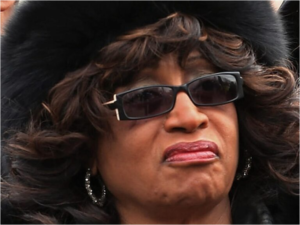

Photo special to the Outlook
EX-CONGRESSWOMAN CONVICTION: After she was found guilty in 2017 on fraud and tax charges related to a charity scam, the full 11th U.S. Circuit Court of Appeals will hear arguments in February in former Congresswoman Corrine Brown’s attempt to overturn her conviction. The appeal centers on arguments by Brown that a juror was improperly replaced during jury deliberations after he said the “Holy Spirit” told him Brown was not guilty. Brown’s attorneys contend that U.S. District Judge Timothy Corrigan’s decision to replace the juror discriminated on the basis of religion and deprived the former Democratic congresswoman of her constitutional rights. But prosecutors argue the man said at the outset of jury deliberations that the Holy Spirit told him Brown was not guilty and that he did not properly weigh the evidence in the case.
GUN LAW: In a case that started after the 2018 mass shooting at Marjory Stoneman Douglas High School, the National Rifle Association is challenging a Florida law that prevents people under age 21 from buying guns. Shortly after the Parkland school shooting, state lawmakers and then-Gov. Rick Scott approved a wide-ranging measure that includes the ban on gun purchases by people under 21. The NRA quickly challenged the ban and contends that the law violates Second Amendment and equal-protection rights. Federal law prevents licensed firearm dealers from selling handguns to people under age 21, but the Florida law went further by banning purchases of rifles and other long guns by people in that age group. U.S. District Judge Mark Walker was slated to hold a trial in January but indefinitely postponed it because of the COVID-19 pandemic.
LOCAL GUN RESTRICTIONS: The state’s 1st District Court of Appeal for months has pondered a case challenging a 2011 law that threatens tough penalties if city and county officials approve gun regulations. Florida since 1987 has barred cities and counties from passing regulations that are stricter than state firearms laws, a concept known as “preemption” of local gun laws. The 2011 law was designed to strengthen the preemption by adding penalties, such as the possibility of local officials facing $5,000 fines and potential removal from office for passing gun regulations. Cities, counties and local elected officials challenged the penalties after the 2018 mass shooting at Marjory Stoneman Douglas High School in Parkland, arguing that the penalties made local officials afraid to move forward with gun-related measures that might not be preempted by the 1987 law. The Tallahassee-based appeals court heard arguments in July.
MEDICAL MARIJUANA LICENSES: In a case that could have important implications for the medical-marijuana industry, Florida Supreme Court justices are looking at whether the state has properly carried out a 2016 constitutional amendment that broadly legalized marijuana for patients. Lower courts have sided in the case with Florigrown, a Tampa-based company that argues a 2017 state law conflicts with the constitutional amendment. Florigrown has unsuccessfully sought approval from the Florida Department of Health to become a licensed medical-marijuana operator.
For more on the original article visit: http://capitaloutlook.com/site/four-florida-legal-fights-to-watch-in-21/

Be the first to comment